
In this era of digital wave sweeping the world, the sharing economy, with its unique business model and innovative ideas, has become a new engine to promote social and economic development. However, with the expanding of its influence, the lag and lack of supervision have gradually emerged, becoming a difficult problem in front of the government, enterprises and the public.
Recently, the Dutch Data Protection Authority issued a sky-high fine of up to 290 million euros to the world's well-known travel service platform Uber, which not only shocked the industry, but also once again triggered people's deep thinking about the boundary and future direction of sharing economy regulation.
The Dutch Data Protection Authority's punishment of Uber is not without purpose. It is reported that Uber has been heavily fined for serious violations in the handling of user data. Specifically, Uber is accused of illegally collecting and using user data, including sensitive information such as location information and travel habits, without the explicit consent of users, and seriously violating users' privacy rights. In addition, Uber was also exposed after the data breach incident, failed to take timely and effective measures to prevent the damage from expanding, further aggravating the risk of user data protection.
This penalty decision is not only a severe punishment for Uber's individual behavior, but also an important warning for the entire sharing economy industry. It tells us that no matter how the technology develops and how the business model is innovative, we must adhere to the bottom line of the law and respect the rights and interests of users, especially in the sensitive area of data protection, which concerns personal privacy.
The Uber fine is just a microcosm of the regulatory challenges in the sharing economy. With the rapid development of the sharing economy, its regulatory challenges have become increasingly prominent:
Legal lag: Traditional laws and regulations are often difficult to adapt to the rapid development of emerging economic models, resulting in frequent regulatory gaps and gray areas.
Different regulatory standards: Different countries and regions have different attitudes and standards in the regulation of the sharing economy, which brings troubles to enterprises' cross-border operations.
Data security and privacy protection: Sharing economy platforms hold massive user data, and how to ensure the safe and compliant use of these data has become an urgent problem to be solved.
Market competition and monopoly: Some sharing economy platforms, with their technological advantages and capital strength, quickly occupy a dominant position in the market, causing monopoly concerns.
The 290 million euro fine imposed by the Netherlands on Uber is undoubtedly a strong deterrent to the sharing economy and an important signal of strengthening supervision. It sends a clear message to sharing economy enterprises around the world: while pursuing commercial interests, they must strictly abide by laws and regulations, respect users' rights and interests, and especially strengthen data protection and privacy security.
This penalty decision not only reflects the Dutch government's high attention to data protection, but also indicates that the sharing economy will face a more stringent regulatory environment in the future. Companies need to re-examine their business models and data management strategies and strengthen compliance to meet increasing regulatory requirements.
Overall, the €290m fine imposed on Uber in the Netherlands is a landmark event in the tightening regulation of the sharing economy. It reminds us that in today's rapid development of the sharing economy, the importance of regulation is self-evident. Only on the basis of parallel compliance and innovation can the sharing economy achieve stability and make greater contributions to economic and social development.

According to EngadTech media reports, the Windows security update recently released by Microsoft has triggered a series of technical issues.
According to EngadTech media reports, the Windows security …
On January 19, 2026, the International Monetary Fund (IMF) …
When Musk brandished a $134 billion lawsuit against OpenAI …
At the beginning of 2026, the global gold market witnessed …
On January 18, EU ambassadors reached a broad agreement to …
In January 2026, Elon Musk took OpenAI and Microsoft to cou…